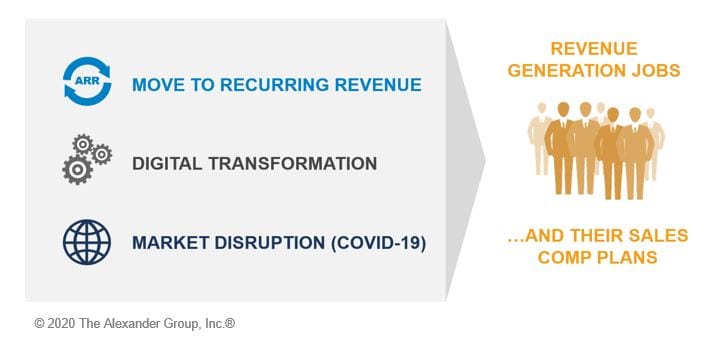Changing Sales Jobs: Why and the Impact on Sales Comp
Today’s market dynamics are significantly affecting jobs focused on driving revenue growth, resulting in the need to update sales compensation plans.
The transition to recurring revenue models, increased use of technology, and the current market disruption due to COVID-19 have forced organizations to re-evaluate the design of their customer-facing jobs and associated sales compensation plans.

Move to Recurring Revenue
Recurring revenue models, also known as usage-based pricing models, are being adopted across all industries—even in sectors where they have not traditionally appeared before. For example John Deere now considers themselves a technology company selling farming insights in addition to equipment. The business case for shifting to a recurring revenue model is strong―customers are asking to pay as they consume, it increases a company’s market valuation, and it enables companies to have a deeper relationship with their customers focusing on solving their business needs. Recurring revenue models requires companies to move from a traditionally linear sales process to a continuous sales process, driving adoption, expansion and renewals post initial sale. Consequently, companies are specializing their jobs across the five recurring revenue sales motions―Identify, Land, Adopt, Expand and Renew (ILAER). For example, account executive, which traditionally owned the entire relationship, may now focus on only land and expand. New jobs like customer success are responsible for adoption to ensure customers realize their value of their offering (thus guaranteeing the renewal and proving the opportunity to upsell/cross-sell). Many companies are coming to realize that adoption is a persuasion activity and therefore should be compensated as such.
Digital Transformation
Digital transformation is also impacting existing roles and introducing new jobs across the five sales motions. Many organizations believe investing in digital transformation is necessary for the survival of the organization. The use of technology and data is resulting in a fundamental change in the way that we engage with customers – the most tangible manifestation is in how companies engage with, sell to, and service customers post-sale. New ways of operating create a need to hire new talent and invest in skillsets focused on digital engagement. New marketing roles emerge, such as social media specialists and content curators to support email campaigns and outbound marketing. Many of these new marketing roles are engaging with customers earlier in the sales process and beginning to persuade the customer earlier in the buyer journey than ever before. In sales, using social media (in particular LinkedIn, but also others such as Instagram, trade group social networks, etc.) requires new skillsets as well. Sellers need to become more adept at using multiple motions to engage with customers and new roles such as chat specialists emerge. More importantly, traditional roles evolve. Inside Sales is now Digital Sales. Field Sales is no longer managed to long-held “customer facing” time expectations.
Market Disruption
COVID-19 has accelerated the pace of digital change in organizations. Many companies that were not prepared for a remote working environment and didn’t have the necessary technology or skills found out that this lack of readiness ended up having a significant impact in the current environment. The need to invest in the technology stack (e.g., collaboration tools, customer support platforms), create new roles and refine existing roles has never been more apparent in order to better adept to a virtual environment.
Sales Compensation Impact
The shift in modern sales jobs because of recurring revenue models, digital transformation and COVID-19 has resulted in the need to re-evaluate current sales compensation practices. As more roles influence the sale, companies are required to reconsider which jobs are eligible to participate in an at-risk sales compensation program. Multiple roles with various responsibilities across the sales process has increased the number of measures options that can be included in a sales compensation program. Additionally, the ability to collect data opens the door to the inclusion of non-traditional financially based metrics. Technology and better data also opens the door to new mechanics like scorecards.
If your company is modernizing its jobs, make sure to “modernize” your sales compensation practices to align pay with desired behaviors.
Learn more about the Alexander Groups job design or sales compensation practices.

